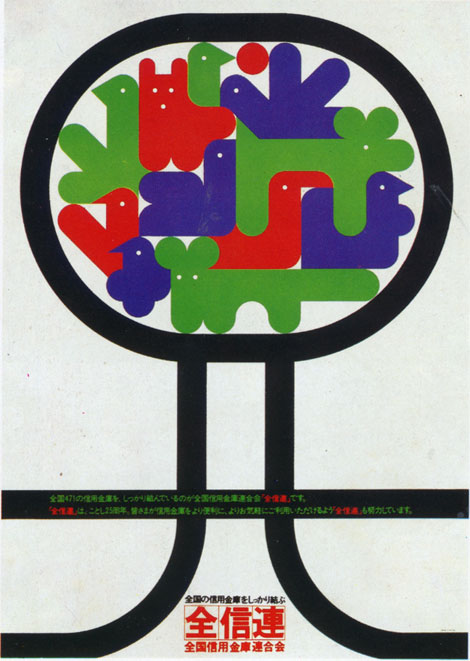
Katsuhiro Otomo created a landmark for Japanese cinema with his anime jaw-breaker Akira in 1988, but he debuted to little acclaim with this existential dream of a film six years earlier.
Boss, a lumbering man mountain living in the woods, comes under repeated attack from a small man dressed in bright colours. His attacks always follow a set pattern. At first, it is a mere annoyance; but the attacks become more frequent, and the assailant becomes stronger and faster each time. The man cannot remember a time when these attacks did not come. At first, the assailant was small and slow, and could be repelled easily; but soon, the attacker's reflexes improve, and he can beat Boss easily. Boss slides into trapped anguish, unable to escape the woods, and when becomes aware of his own horrific appearance after catching sight of himself in a magic pool, and becomes self-conscious about his golden colouring and extra limbs.
His sadness at becoming weaker is doubled by his inability to defend his friends, small birds that live in his hunchback. They fly out to help him whenever the assailant appears, but they vanish when hit, leaving numbers floating slowly heavenward, and sometimes burger-shaped treats or stars. Long sequences in the mid-section, some of the most thoughtful in the film, show Boss, a man who is used to being strong, contemplating his weaknesses, and cowering in fear whenever he hears a noise.
Boss' tragedy is that he never discovers the nature of his true place in life. This is revealed to us with an alarming shot near the end of the movie: Boss is shown to be an end-of-level baddie in an arcade game. The camera withdraws from his face, accelerates backwards into the sky, giving us an overview of the multi-faceted colour world in which he lives, which then dissolves into pixels and then becomes an image on a screen of an arcade machine in the corner of a canteen at an ice-skating rink in a small town in a large state in the middle of America. This delirious, epic reveal takes a full minute, and the dazzling melange of live footage from completely different locations, computer graphics and overlaid dialogue from the boys playing the game ("Remember when this boss seemed hard?" "Yeah! But now you just kill him so easy!") is stunning.
 This neon requiem for the unnamed henchmen of violent arts provoked small controversy in Japan when the self-proclaimed Sad Cult, a group of teenagers in Osaka, drove their car into a river, leaving behind a note reading 'We Are Sorry, Boss'. The soft underbelly of the electronic future was exposed, leaving millennium-dreamers and candied ravers alike cold: who wants apocalyptic sadness when glitter-guns and jet-packs are loaded and ready? Thus the film limped to little success; but the failings bode well for it's longevity to wire-cynics and flagrant End-fearers.
This neon requiem for the unnamed henchmen of violent arts provoked small controversy in Japan when the self-proclaimed Sad Cult, a group of teenagers in Osaka, drove their car into a river, leaving behind a note reading 'We Are Sorry, Boss'. The soft underbelly of the electronic future was exposed, leaving millennium-dreamers and candied ravers alike cold: who wants apocalyptic sadness when glitter-guns and jet-packs are loaded and ready? Thus the film limped to little success; but the failings bode well for it's longevity to wire-cynics and flagrant End-fearers.Arase Sakiwake, a former Sumo wrestler (known as The Pepper-Shaker), played Boss in his only film role. He insisted on preparing for the role each day by changing into a kesho-mawashi, an ornate, embroidered silk 'apron', which he wore at all times on set before changing into his golden costume. It is believed that his payment for the role, at his own insistence, was the same amount that he would have received had he wrestled in a championship bout, and no more. Sakiwake later had his own chatshow on Japanese TV, called Sexy Baby, and was famous in Japan for a series of humorous cat-food commercials that referenced Super Magic Boss. Davis Tanahashi is gratingly perky as the ridiculously uniformed assailant (named in the end credits as Player One), whose initial enthusiasm soon turns to cocky and cruel showboating as he masters Boss' loud but limited movements.
The movie was remade for the American market in 1985 as Colorworld, and starred Andre The Giant as Boss. M Night Shyamalan took the plot of Super Magic Boss as the basis for 2007's critically panned Supernatural Echo Complex, starring Nicole Kidman as an evil valkyrie who knows not what she does.
An arcade unit based on the original movie was created by Namco in 1983, and spawned a series: Super Super Magic Boss 2:Extra Magic-Docious is considered one of the classics of the arcade era, and it's broody humour captivated young teens further when it made an appearance on the Nintendo Entertainment System in cartridge form in 1987 as Super Super Super Magic Boss X. To this day, many gamers in the West are in the dark as to the cinematic origins of this legendary title.





No comments:
Post a Comment